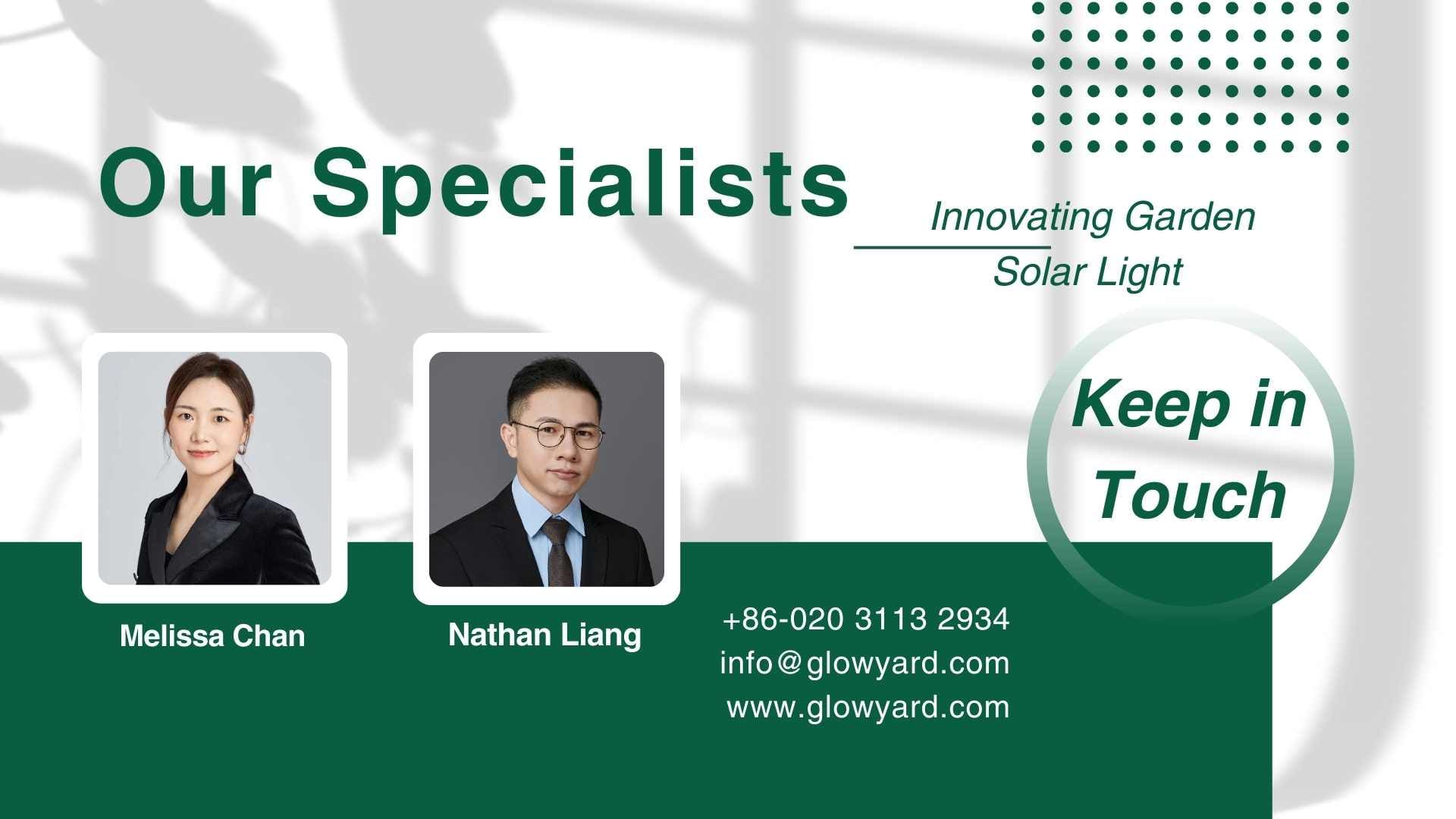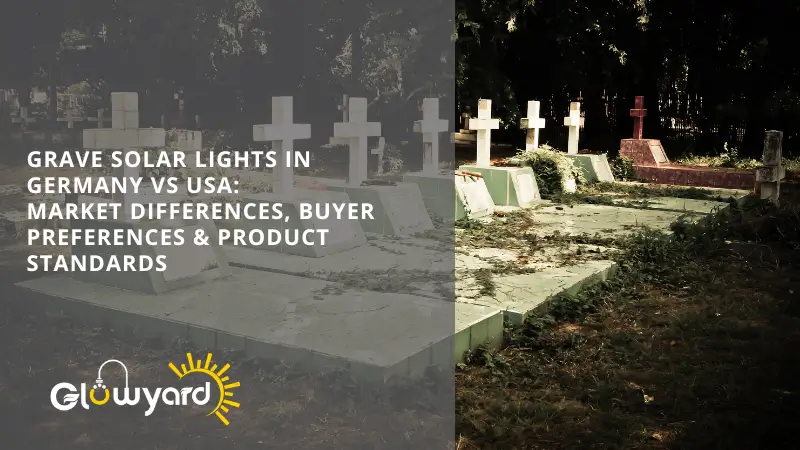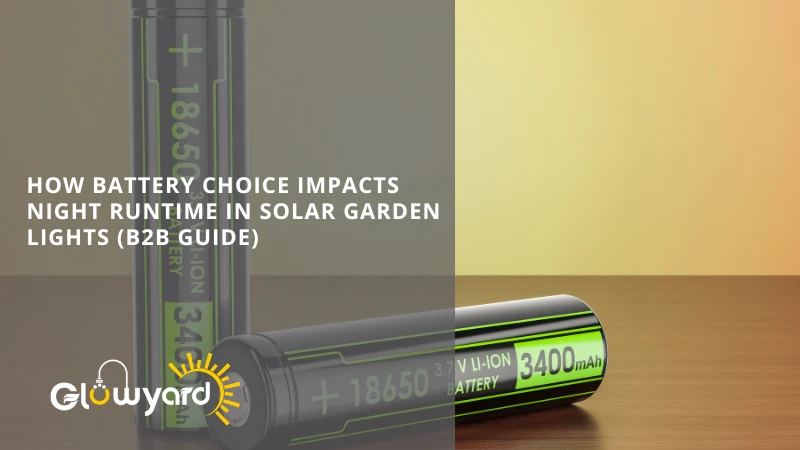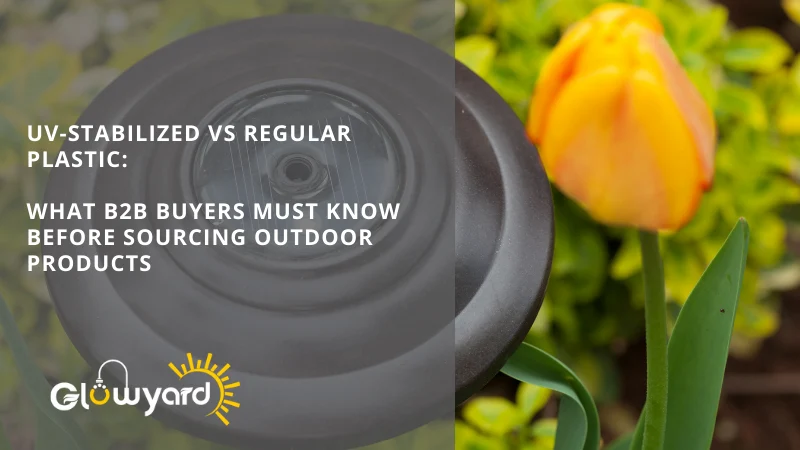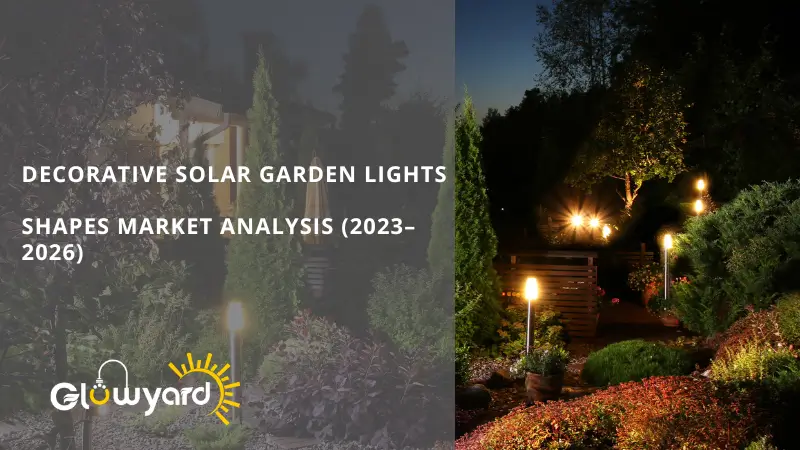💡 7 Tips for B2B Bulk Purchasing Solar Powered Mason Jar Lights✨
Solar-powered mason jar lights have emerged as a charming and eco-friendly lighting solution, gaining significant traction not only in residential settings but also within the business-to-business (B2B) market. Their unique blend of rustic aesthetics, energy independence, and ease of use makes them increasingly popular for a variety of commercial applications. Businesses are recognizing the value of these versatile lights for purposes ranging from creating enchanting ambiances for events and commercial decor to offering them as sustainable resale products.
However, navigating the B2B landscape for bulk purchasing requires a more strategic approach than individual consumer buys. The importance of selecting the right products for bulk acquisition cannot be overstated, as it directly impacts your business’s profitability, customer satisfaction, and operational efficiency. Whether you’re an event planner seeking to illuminate outdoor venues, a retailer looking to stock a popular eco-conscious item, or a hospitality business aiming to enhance its ambiance, making informed decisions is paramount.
The purpose of this guide is to provide actionable tips for B2B buyers to confidently and effectively purchase solar-powered mason jar lights in bulk. By understanding key considerations and best practices, businesses can secure high-quality products that meet their specific needs, align with their brand values, and deliver exceptional value.
II. Understand Your Business Needs 🎯
Before embarking on bulk purchases of solar-powered mason jar lights, a thorough understanding of your specific business requirements is essential. This foundational step will guide all subsequent decisions, from product specifications to supplier selection.
1. Define the Purpose of the Purchase:
Clearly articulate why you are buying these lights in bulk. Different purposes necessitate different product attributes and quantities.
- Retail Resale: If you’re a retailer (e.g., home decor store, gift shop, garden center), your primary goal is to offer a popular, attractive, and reliable product to your customers. Considerations here include packaging, perceived value, and unique selling propositions that differentiate your offering. You might prioritize aesthetically pleasing designs, diverse color options, and competitive pricing for healthy profit margins.
- Event Decoration: For event planners or rental companies, the focus shifts to creating a specific ambiance and ensuring durability for repeated use. Key factors include consistent light output, ease of setup and takedown, a robust design that can withstand various weather conditions (if outdoor), and the ability to charge efficiently during the day to last through an evening event. Versatility in hanging options (handles, hooks) might also be important.
- Outdoor Venue Lighting (e.g., restaurants, cafes, hotels): Businesses looking to enhance their outdoor spaces need lights that provide consistent, reliable illumination and contribute to the overall aesthetic. Durability, long-lasting battery life, and a subtle yet effective light output are crucial. The ability to blend seamlessly with existing decor and minimal maintenance requirements are also important.
- Corporate Gifting/Promotional Items: If the lights are intended as branded gifts or promotional giveaways, customization options (e.g., logo imprinting on the jar or lid) become a significant factor. You’ll need to balance cost-effectiveness with a quality product that reflects well on your brand.
2. Identify Target Audience or End-Users:
Who will ultimately be using or benefiting from these lights? Understanding your end-user will inform your product choices.
- Event Planners: They need reliability, ease of deployment, and often a certain aesthetic (e.g., rustic, whimsical, elegant).
- Home Decor Enthusiasts (for retail): They value aesthetics, unique designs, and often seek a good balance of quality and affordability.
- Restaurant/Cafe Owners: They prioritize ambiance, durability, and low maintenance.
- Businesses focused on sustainability: They will value eco-friendly materials, efficient solar panels, and long-lasting components.
3. Determine the Required Quantity and Budget Constraints:
Bulk purchasing inherently involves larger quantities, but the exact number will depend on your defined purpose and anticipated demand.
- Quantity:
- For retail: Analyze past sales data, forecast seasonal demand, and consider minimum order quantities (MOQs) from suppliers.
- For events/venues: Calculate the number of lights needed per event or for a specific space, factoring in potential breakage or loss, and maintaining a buffer stock.
- For promotional items: Base the quantity on the scale of your campaign or the number of recipients.
- Budget:
- Establish a clear budget range for your bulk purchase. This will help you narrow down supplier options and product tiers.
- Consider not just the unit cost, but also shipping, potential import duties, and any customization fees.
- Remember that while lower prices are attractive, compromising on quality for bulk purchases can lead to higher long-term costs due to returns, replacements, or negative customer feedback. Balance cost-effectiveness with the necessary quality for your intended use.
- Explore potential discounts for larger quantities, and be prepared to negotiate with suppliers.
III. Evaluate Product Quality and Features ✨
Once you have a clear understanding of your business needs, the next critical step is to rigorously evaluate the quality and features of the solar-powered mason jar lights themselves. This ensures that the bulk purchase will meet performance expectations and offer long-term value.
1. Durability and Materials:
The longevity and reliability of solar mason jar lights, especially for outdoor or repeated use, depend heavily on the materials used in their construction.
- Lid Material: Prioritize lids made from stainless steel (304 grade is excellent for corrosion resistance) or high-quality, UV-resistant ABS plastic. Avoid thin, flimsy plastic or poorly coated metals that can quickly rust or degrade in outdoor conditions. Stainless steel offers superior resistance to rust and weather elements.
- Jar Material: While traditional mason jars are glass, consider the end-use. For high-traffic areas, events where breakage is a concern, or products for children, shatter-resistant plastic jars (e.g., acrylic or durable PET) might be a safer and more practical choice. If glass, ensure it’s thick and robust.
- Seals and Gaskets: Inspect the seals around the lid and light unit. Effective rubber gaskets or O-rings are crucial for preventing water ingress and protecting the internal electronics.
2. Solar Panel Efficiency:
The solar panel is the heart of the charging system. Its efficiency directly impacts how well the lights perform.
- Wattage/Size: Look for solar panels with sufficient wattage for reliable charging, especially if the lights will be used in areas with less direct sunlight. Larger panels generally equate to more efficient charging.
- Type of Solar Cell: Monocrystalline silicon panels are typically the most efficient, followed by polycrystalline. Amorphous silicon is less efficient but can perform better in low light conditions. For most outdoor applications, monocrystalline or good quality polycrystalline panels are preferred.
- Encapsulation: Ensure the solar panel is well-encapsulated (e.g., with clear epoxy or tempered glass) to protect it from moisture, dust, and UV degradation.
3. Battery Life and Capacity:
The battery determines how long the lights will stay illuminated after dark.
- Battery Type:
- NiMH (Nickel-Metal Hydride): Common and generally reliable, but can suffer from memory effect if not fully discharged regularly. They perform well in moderate temperatures.
- Li-ion (Lithium-ion): Often found in higher-end models, offering better energy density, longer cycle life, and less memory effect. They also tend to perform better in colder temperatures.
- LiFePO4 (Lithium Iron Phosphate): A more stable and safer type of lithium battery, with a very long cycle life, though potentially higher upfront cost.
- Capacity (mAh): Look for higher milliamp-hour (mAh) ratings, as this indicates a greater capacity to store energy and thus longer runtime. For consistent all-night illumination, aim for batteries with capacities that support 8-12 hours of light, especially during shorter winter days.
- Replaceability: Ideally, the batteries should be user-replaceable. This significantly extends the lifespan of the product and reduces waste.
4. Lighting Modes and Brightness:
Versatility in lighting can add significant value, particularly for event planners or retailers.
- Brightness (Lumens): While not always specified for decorative lights, a general idea of brightness is useful. Some manufacturers might state lumens; otherwise, look for descriptions like "soft glow," "ambient light," or "bright accent."
- Lighting Modes:
- Steady On: The most basic mode.
- Flickering: Mimics a candle flame, ideal for creating a cozy or romantic ambiance.
- Color-Changing: Offers dynamic visual effects, often with an option to select a single color. This adds flexibility for different themes or moods.
- Timer Functions: Some advanced models may include automatic timers (e.g., 6 hours on, 18 hours off).
- Adjustable Brightness: The ability to dim or brighten the lights can be a valuable feature for fine-tuning the atmosphere.
5. IP Rating (Ingress Protection):
This international standard indicates a product’s resistance to solids (like dust) and liquids (like water). It’s crucial for outdoor lighting.
- Understanding the Rating (IPXY):
- The first digit (X) indicates protection against solids (0-6). 6 means dust-tight.
- The second digit (Y) indicates protection against liquids (0-9K).
- Recommended IP Ratings for Outdoor Use:
- IP44: Protected against solid objects over 1mm and splashing water from any direction. Suitable for sheltered outdoor areas.
- IP65: Highly recommended for most outdoor solar lights. This means it’s dust-tight and protected against low-pressure water jets from any direction. It can withstand rain and splashes.
- IP67: Dust-tight and protected against immersion in water up to 1 meter for 30 minutes. Excellent for very wet environments or where temporary submersion might occur.
- Ensure the specified IP rating aligns with the intended exposure to weather elements. For general outdoor use and reliability, aim for at least IP65.
IV. Assess Supplier Reliability ✅
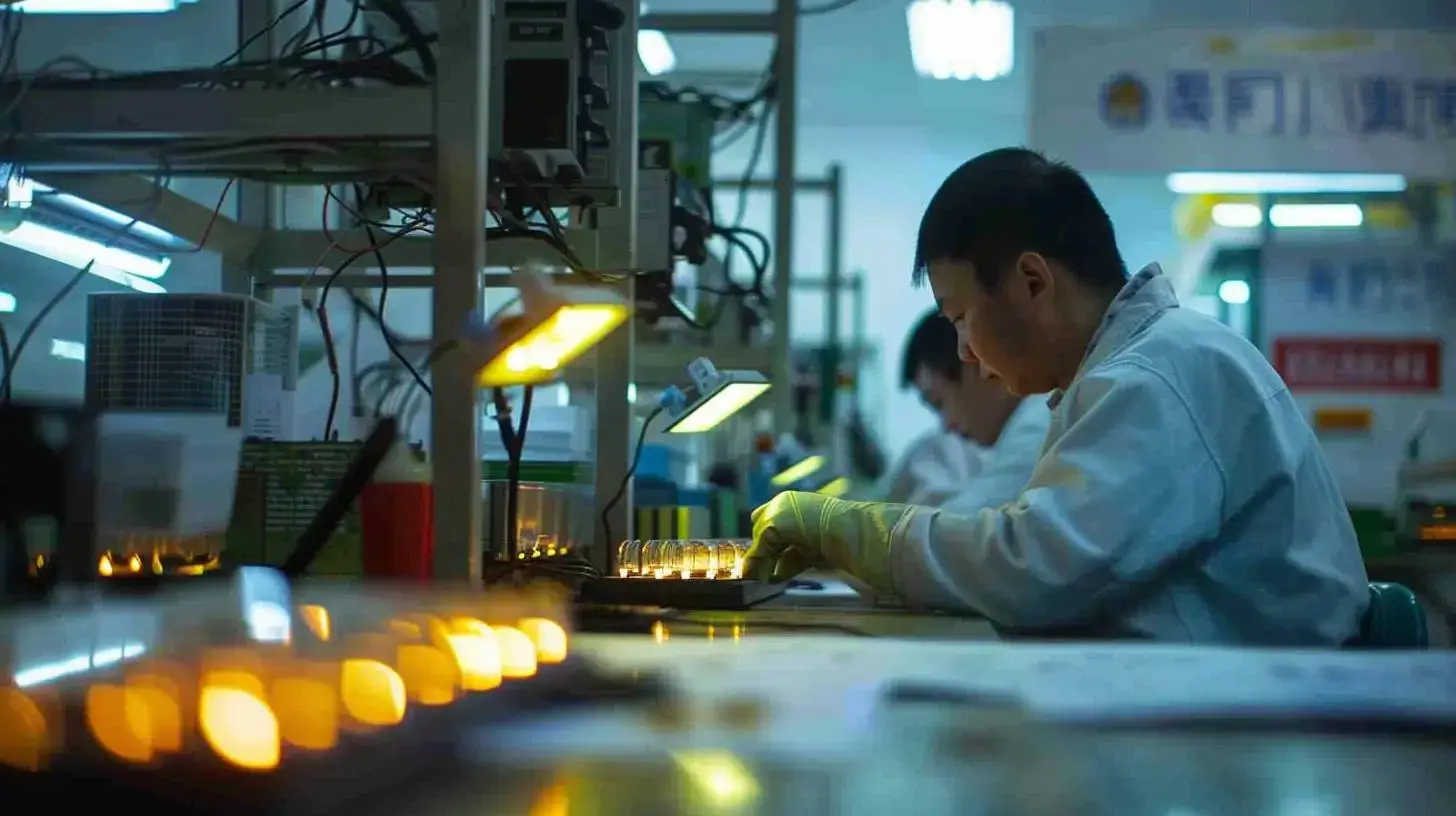
Selecting a reliable supplier is as crucial as choosing the right product. A reputable supplier ensures consistent quality, timely delivery, and effective support, all of which are vital for successful B2B bulk purchasing.
1. Research Supplier Reputation and Reviews:
Before committing to a bulk order, thoroughly investigate the supplier’s standing in the market.
- Online Presence and Reviews: Check their website (look for customer testimonials, and search for independent reviews on B2B platforms or industry forums.
- Case Studies/References: A reliable supplier might be able to provide case studies or references from other B2B clients, especially for large orders.
- Consistency: Look for patterns of consistent quality and on-time delivery in their reviews and history.
2. Verify Certifications:
Certifications demonstrate a supplier’s commitment to quality, safety, and environmental standards.
- Product Certifications: Ensure the solar-powered mason jar lights themselves carry relevant product certifications. For Glowyard, these include CE, RoHS, FCC, UL, UKCA, and IP44. These certifications are crucial for market entry, especially in regions like Europe (CE, UKCA) and the US (FCC, UL). IP44 indicates protection against splashing water and solid objects larger than 1mm.
- Factory Certifications: Look for certifications related to the manufacturing facility. Glowyard Lighting holds BSCI, ISO9001, and Sedex certifications. ISO9001 signifies a robust quality management system, while BSCI and Sedex relate to ethical and responsible supply chain practices.
3. Check for Bulk Order Discounts, Minimum Order Quantities (MOQs), and Flexible Terms:
Understanding a supplier’s pricing structure and flexibility is key to cost-effective bulk purchasing.
- MOQs: Inquire about their Minimum Order Quantities. Glowyard offers a low MOQ of 50 units for simple customizations and generally flexible MOQs. They even offer an MOQ as low as 30-50 pieces for customers committing to long-term cooperation (e.g., annual orders over 10,000 pieces). For more complex customizations (material/structure changes), MOQs range from 300-500 pieces, while completely original designs may require 1000+ pieces.
- Bulk Discounts: Discuss tiered pricing for larger quantities. Glowyard offers bulk discounts and can provide tiered pricing for deeper customizations, such as a 10% price reduction for orders over 500 units.
- Customization Options: Verify what level of customization is available. Glowyard offers extensive customization for materials, appearance, and energy efficiency, and can even help procure non-lighting related products. They offer custom packaging, logos, and solar technology upgrades, including OEM/ODM for tailored designs.
- Payment Terms: Discuss payment schedules and any credit options.
- Sampling Policy: Inquire about sample availability. Glowyard offers fast sampling and free samples for verified buyers.
4. Evaluate After-Sales Support, Warranty Periods, and Return Policies:
Strong after-sales support is crucial for addressing any issues that may arise.
- Warranty: Understand the warranty period for their products and what it covers.
- Return Policy: Clarify the process for returning defective or damaged goods.
- Technical Support: Inquire about available technical support for troubleshooting or product guidance.
- Additional Services: Glowyard, for example, provides "READY-TO-GO" e-commerce materials, including customized Amazon A+ pages, short video content, and multilingual product descriptions, along with one-stop dropshipping services. They also offer door-to-door shipping (DDP terms available).
Glowyard Garden Lighting: Your Reliable Supplier in B2B Solar Garden Lighting 🤝
With over 15 years of expertise since 2010, Glowyard Garden Lighting stands as a leader in sustainable and decorative solar solutions for outdoor spaces. Based in Guangzhou, China, with advanced production facilities in Fujian and Guangdong, we’re dedicated to delivering innovative, high-quality solar garden lights designed for the B2B market, including e-commerce businesses, retailers, and brands worldwide.
V. Consider Customization and Branding Opportunities 🎨
For B2B buyers, particularly those in retail, event planning, or corporate gifting, customization and branding can transform generic products into unique assets that enhance brand identity and appeal to specific target markets.
1. Explore Options for Custom Designs:
Beyond standard off-the-shelf products, investigate the extent to which a supplier can tailor the solar mason jar lights to your specific vision.
- Logo Engraving/Printing: This is a fundamental branding opportunity. Can your logo be engraved directly onto the solar lid, or printed on the jar itself?
- Unique Jar Shapes or Sizes: While mason jars have a classic look, a supplier might offer variations in jar shape or even different glass (or plastic) colors beyond clear. Glowyard, for instance, has developed over 300 unique solar garden lights and offers customization for appearance and materials.
- LED Color/Mode Customization: Can the internal LED lights be customized to specific colors or offer unique lighting modes beyond the standard options? Glowyard allows for solar tech upgrades and can customize energy efficiency.
- Material Changes: If you have specific durability or aesthetic requirements, inquire if materials can be changed (e.g., metal substituted for plastic).
- Complete Original Designs (OEM/ODM): For brands seeking a truly exclusive product, can the supplier develop a completely new design from scratch based on your specifications? Glowyard offers OEM/ODM services for custom designs.
2. Assess Whether Suppliers Offer Bulk Packaging Tailored for Resale or Branding Purposes:
Packaging is a crucial element, especially for retail.
- Custom Packaging: Can the lights be packaged in custom-designed boxes or inserts that feature your brand’s colors, logo, and messaging? This enhances the unboxing experience and reinforces brand identity.
- Retail-Ready Packaging: If for resale, is the packaging designed to be attractive and informative for end-consumers? This might include clear product descriptions, care instructions, and appealing graphics.
- Sustainable Packaging Options: For eco-conscious brands, inquire about options for recycled, recyclable, or minimal packaging to align with sustainability goals. Glowyard’s new collection mentions "zero-waste packaging".
- Bulk vs. Individual Packaging: Clarify how the lights will be packed for bulk shipment – individually boxed within larger cartons, or simply bulk-packed. This impacts your handling and repackaging needs.
3. Ensure Customization Aligns with Your Brand Identity and Target Market Preferences:
Any customization should be a deliberate choice that reinforces your brand and appeals to your audience.
- Brand Consistency: Does the customized product accurately reflect your brand’s values, aesthetics, and overall message? For example, a high-end boutique might opt for subtle engraving and premium packaging, while a rustic decor brand might prefer more distressed finishes.
- Target Market Appeal: Will the chosen customizations resonate with your target customers? If your market values sustainability, highlight eco-friendly materials or energy efficiency. If they prefer a whimsical style, lean into unique shapes or fairy light elements.
- Cost vs. Value: While customization adds cost, evaluate if the enhanced brand perception and market appeal justify the investment. Glowyard provides tiered MOQs and pricing for various customization levels, from minor aesthetic adjustments (50-100 pieces) to full original designs (1000+ pieces). They also mention flexible solutions like shared molds to reduce costs.
VI. Analyze Cost vs. Value 💰
When making B2B bulk purchases, the lowest price isn’t always the most economical choice. A true understanding of value involves looking beyond the initial cost to consider quality, features, longevity, and long-term savings.
1. Compare Pricing Across Suppliers While Factoring in Quality, Features, and Longevity:
- Unit Cost vs. Total Value: Obtain detailed quotes from multiple suppliers, but don’t simply compare the per-unit price. Instead, consider what that price includes in terms of:
- Material Quality: Is the lid stainless steel or flimsy plastic? Is the jar shatter-resistant?
- Solar Panel Efficiency: Does it have a high-wattage, efficient solar panel for reliable charging?
- Battery Performance: What is the battery type (e.g., NiMH, Li-ion) and stated runtime (e.g., 8-12 hours)? Glowyard’s products typically offer 6-8 hours with 300mAh batteries, with options for larger capacity upon request.
- IP Rating: Does it meet the necessary IP rating (e.g., IP65) for your intended outdoor use? Glowyard’s products are IP44 waterproof.
- Certifications: Are essential certifications like CE, RoHS, FCC, UL, and UKCA present? Glowyard’s products are CE/ROHS-certified.
- Supplier Reputation and Service: Factor in the supplier’s reliability, customer service, and after-sales support. Glowyard has over 15 years of exporting experience and offers various services for e-commerce clients, including custom packaging, fast sampling, and dropshipping.
- Total Cost of Ownership (TCO): Consider the full lifecycle cost. A cheaper light that needs frequent replacement or repair will end up costing more in the long run than a slightly more expensive, durable alternative.
2. Calculate Long-Term Savings from Solar-Powered Lights:
Highlighting these savings can be a strong selling point if you are reselling, or a significant benefit if using them for your own business operations.
- No Electricity Costs: This is the most obvious and significant saving. Once installed, solar lights operate independently of the grid, eliminating ongoing utility expenses.
- Low Maintenance: Quality solar lights require minimal maintenance beyond occasional cleaning of the solar panel. This reduces labor costs compared to wired lighting systems that might require more complex wiring checks or bulb replacements.
- Ease of Installation: No wiring means faster and cheaper installation, saving on professional electrician fees. While not a direct "cost saving" for the light itself, it contributes to overall project cost efficiency.
- Environmental Benefits: While not a direct monetary saving, the reduced carbon footprint can be a valuable asset for brands promoting sustainability, potentially attracting eco-conscious customers or aligning with corporate responsibility goals. Glowyard focuses on creating products that "contribute to a greener planet".
3. Avoid Choosing the Cheapest Option if it Compromises Quality or Reliability:
- "You Get What You Pay For": This adage often holds true with solar lighting. Extremely low-priced options frequently use inferior solar panels, low-capacity batteries (often non-replaceable), and flimsy materials that quickly degrade.
- Risk of Dissatisfaction: For retail, low-quality products lead to customer complaints, returns, and damage to your brand reputation. For events or venues, unreliable lights can ruin an atmosphere or cause operational headaches.
- Hidden Costs: The cheapest option might come with hidden costs like high shipping fees, poor packaging leading to damage, or a lack of certifications that prevent legal import or sale in certain markets.
- Long-Term Partnership: For bulk purchasing, you’re looking to establish a long-term relationship with a supplier. A supplier offering unsustainably low prices might also offer poor service or be financially unstable. Glowyard, for example, prioritizes customer satisfaction and aims for continuous innovation. They also offer lower MOQs for simple customization to attract small to medium-sized buyers, but clearly outline the MOQs for deeper customization based on the higher upfront costs involved.
VII. Verify Sustainability and Eco-Friendliness ♻️
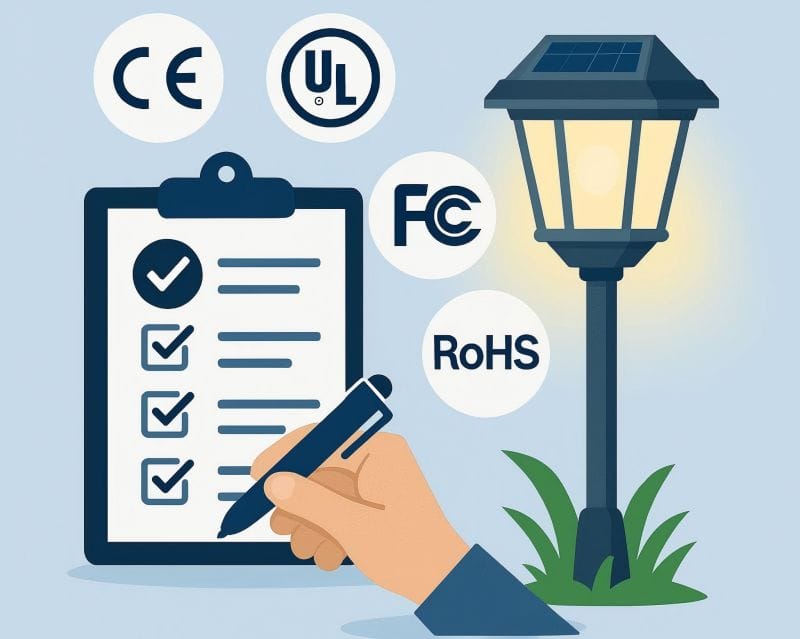 Checklist with CE, UL, FCC, and RoHS certifications next to solar garden light[/caption]
Checklist with CE, UL, FCC, and RoHS certifications next to solar garden light[/caption]
In today’s market, sustainability is a significant consideration for many businesses and their customers. Verifying the eco-friendliness of your solar-powered mason jar lights can be a strong selling point and align with corporate social responsibility goals.
1. Confirm the Use of Eco-Friendly Materials:
- Recyclable Materials: Prioritize products made with highly recyclable materials. Glass mason jars are inherently recyclable. For plastic components, inquire about the type of plastic used and its recyclability. Stainless steel lids are also recyclable.
- Non-Toxic Components: Ensure that all materials, including the LEDs, batteries, and any internal components, are free from harmful heavy metals (like lead or mercury) or toxic chemicals. RoHS certification (Restriction of Hazardous Substances) is a key indicator here, which Glowyard’s products possess.
- Battery Type: While all batteries have an environmental impact, some are considered "greener" than others. Lithium-ion batteries often have a longer lifespan and better energy density, potentially leading to less frequent replacement compared to some NiMH batteries. Inquire if the batteries are easily replaceable, which extends the product’s lifespan and reduces waste.
- Packaging: Ask about the supplier’s packaging practices. Are they using recycled content, minimalist packaging, or easily recyclable packaging materials? Glowyard’s new collection mentions "zero-waste packaging".
2. Check if the Supplier Follows Sustainable Manufacturing Practices:
Beyond the product materials, the manufacturing process itself contributes to sustainability.
- Certifications: Look for factory certifications that indicate sustainable or ethical practices. Glowyard Lighting holds BSCI, ISO9001, and Sedex certifications.
- ISO 9001 primarily relates to quality management, but it can indirectly support sustainability by promoting efficient processes and reducing waste.
- BSCI (Business Social Compliance Initiative) and Sedex (Supplier Ethical Data Exchange) are focused on ethical trade and responsible supply chains, which often include environmental performance alongside labor rights and safety.
- Energy Efficiency in Production: While harder to verify remotely, you can inquire if the factory uses renewable energy sources, has energy-saving measures in place, or strives to minimize its carbon footprint during production.
- Waste Management: Ask about their waste reduction and recycling programs within their manufacturing facilities.
3. Highlight the Environmental Benefits of Solar-Powered Lighting for Marketing to Eco-Conscious Clients:
Solar-powered lighting inherently offers significant environmental advantages that can be leveraged in your marketing and sales efforts.
- Reduced Carbon Footprint: Emphasize that these lights run on clean, renewable solar energy, significantly reducing reliance on fossil fuels and lowering carbon emissions. Glowyard explicitly states their focus on creating products that "contribute to a greener planet".
- Energy Independence: Highlight that they require no grid electricity, leading to zero ongoing energy consumption costs and no contribution to power plant emissions.
- Lower Maintenance & Waste: Due to their self-sufficient nature, they typically require less maintenance and fewer disposable parts (like traditional light bulbs, assuming rechargeable and replaceable batteries are used), contributing to less waste over time.
- Promote a Sustainable Image: For your B2B clients, offering solar-powered solutions helps them present an eco-conscious image to their own customers, aligning with growing consumer demand for sustainable products. Glowyard offers products that "elevate outdoor spaces while reducing carbon footprints".
VIII. Test Samples Before Bulk Ordering 🧪

Even after thorough research and supplier vetting, requesting samples is a non-negotiable step before committing to a large bulk order. This allows you to verify quality and performance directly.
1. Request Product Samples to Evaluate Quality, Performance, and Suitability Firsthand:
- Physical Inspection: Once samples arrive, meticulously inspect them for material quality, build consistency, and overall finish. Check the solar panel integration, the robustness of the lid, and the clarity or durability of the jar.
- Feature Verification: Confirm that all advertised features are present and functioning correctly, such as different lighting modes, brightness levels, and ease of operation.
- Aesthetic Alignment: Ensure the sample’s appearance matches your expectations and aligns with your brand’s aesthetic or your clients’ preferences.
- Packaging Review: If customized packaging is an option, review samples of the packaging to ensure it’s durable, well-designed, and suitable for resale or gifting.
2. Test Under Real-World Conditions (e.g., Outdoor Exposure, Varying Weather) to Ensure Reliability:
- Outdoor Performance: Place the samples in the actual environment where they will be used. This means exposing them to direct sunlight for charging and observing their illumination at night.
- Weather Resistance: Crucially, test their performance in various weather conditions. If intended for outdoor use, expose them to rain, humidity, and temperature fluctuations to verify their IP rating and overall durability. Do they still charge efficiently on cloudy days? Do they hold up in a light drizzle or a heavy downpour?
- Battery Runtime: Monitor how long the lights stay illuminated on a full charge. Compare this against the supplier’s stated battery life (e.g., 8-12 hours runtime, or Glowyard’s typical 6-8 hours with 300mAh batteries, with options for larger capacity). This is vital for ensuring they meet the required performance for events or commercial spaces.
- Durability in Use: If applicable, simulate typical handling or usage scenarios to test the product’s robustness. For event rentals, this might involve setting them up and taking them down multiple times.
3. Gather Feedback:
- Internal Team: Have key members of your team (e.g., procurement, marketing, sales, or operations) evaluate the samples and provide their feedback.
- Target Audience (if possible): For retail businesses, consider getting informal feedback from a small group of target customers or trusted individuals to gauge their initial impressions and appeal.
- Identify Issues: Document any issues or concerns immediately, no matter how minor. This feedback is critical for negotiating improvements with the supplier or making an informed decision about proceeding with the bulk order.
IX. Summary 🎉
Choosing the right solar-powered mason jar lights for B2B bulk purchasing is a strategic decision that can significantly impact your business’s success, whether for resale, event enhancement, or commercial decor. By following a structured approach, buyers can ensure they acquire products that not only meet their immediate needs but also offer long-term value and align with their brand’s objectives.
Key takeaways for informed bulk purchasing include:
- Understanding Your Specific Needs: Clearly define the purpose of your purchase, identify your target audience, and set realistic quantity and budget constraints. This foundational step ensures all subsequent decisions are aligned with your business goals.
- Thorough Product Evaluation: Prioritize durability with weather-resistant materials like stainless steel lids and robust jars. Look for efficient solar panels and batteries that provide reliable, long-lasting illumination (e.g., 6-8 hours or more runtime). Verify appropriate IP ratings (e.g., IP44) for outdoor use and consider lighting modes and brightness for versatility.
- Assessing Supplier Reliability: Research supplier reputation, verify crucial certifications like CE, RoHS, FCC, UL, UKCA, ISO9001, BSCI, and Sedex, and understand their MOQs and bulk discount structures. A supplier like Glowyard, with over 15 years of experience and a strong commitment to quality and customer service, offers flexible terms and comprehensive support for B2B clients.
- Leveraging Customization and Branding: Explore opportunities for custom designs, logo integration, and tailored packaging to differentiate your offerings and strengthen your brand identity. Glowyard offers extensive customization for materials, appearance, and energy efficiency, including OEM/ODM services.
- Analyzing Cost vs. Value: Look beyond the initial price tag. Calculate the long-term savings from solar power (zero electricity costs, low maintenance) and prioritize quality and reliability over the cheapest option to avoid future expenses and customer dissatisfaction.
- Verifying Sustainability: Confirm the use of eco-friendly and non-toxic materials (e.g., recyclable glass, RoHS certification) and inquire about sustainable manufacturing practices. Highlight the environmental benefits of solar lighting in your marketing.
- Testing Samples: Always request and thoroughly test product samples under real-world conditions. This crucial step allows for firsthand evaluation of quality, performance, and suitability before placing a large order.
By diligently applying these tips, B2B buyers can confidently navigate the solar-powered mason jar light market, securing high-quality, cost-effective, and sustainable products that illuminate their business ventures and delight their customers.

